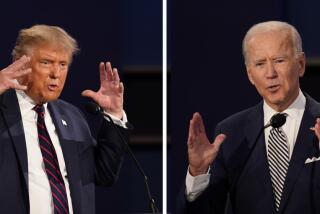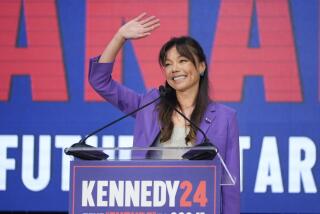John Edwards
When John Edwards was a lad of 11 and a teacher assigned an essay on career aims, he wrote “Why I Want to be a Lawyer” -- a lofty ambition for the son of a millworker growing up in a tiny North Carolina town.
Now Edwards wants to be president. And the 20 years he spent as a lawyer are turning out to be one of his biggest political assets -- and potential liabilities.
Thanks largely to donations from members of the legal profession, Edwards raised more money in this year’s first three months than any other Democratic presidential candidate, boosting his profile in the race. His trial lawyer’s gift of gab, which helped him win many lucrative liability cases, also charms many voters meeting the first-term senator from North Carolina for the first time.
But Edwards’ past is a bull’s-eye for Republicans, who deride him as a onetime ambulance-chaser who became a millionaire and now masquerades as a man of the people.
Some critics also refer to him as a “Ken doll” -- shorthand for a handsome but shallow novice.
Even admiring Democrats worry that his long legal resume and short political career might be too light on governing and foreign policy expertise for him to win in the post-Sept. 11 era.
“I’m a traditional person who likes to see a president with more experience,” said Barbara Londonderry, a retiree who attended a recent house party for Edwards in New Hampshire, the state that holds 2004’s first primary. “He’d make an excellent vice president.”
Edwards, one of nine Democratic presidential candidates, is trying to turn his lack of an extensive political background into a selling point.
“The experience I have is the right kind of experience: I do see things through the eyes of most Americans,” he said as his campaign van whisked him around southern New Hampshire one weekend.
“I don’t think staying in Washington for decades strengthens your ability to do what needs to be done.”
“What we get from [President] Bush,” Edwards tells voters, “is government of the insiders, by the insiders and -- unfortunately -- for the insiders.”
Such anti-establishment rhetoric worked well in the mid-1990s, when voter hostility toward government ran high. But a major question for Edwards is whether that message will resonate in a time when many voters see government as their protector against terrorism.
“Because of 9/11, the timing is not perfect for Edwards,” said a Democratic strategist working for another presidential candidate.
His admirers, however, see a candidate brimming with promise. Edwards, 49, is a quick study. He comes from the South, the only region that has produced Democratic presidents in the last 40 years. And he has a rags-to-riches life story, albeit one indelibly scarred by the death of his teenage son in a car accident.
After the tragedy, Edwards and his wife -- both in their 40s -- decided to have more children.
As a relative political newcomer, Edwards is focusing much of his energy on introducing himself to voters. His stump speech seeks to establish him as a son of the rural South who fights for the little guy.
He makes his biography Exhibit A in the case for his candidacy. He was the first in his family to go to college. He got his first store-bought suit after finishing law school in 1977. Now, he relishes the contrast with Bush’s privileged background and storied political pedigree.
“President Bush comes from a very different place than I,” Edwards said at a town hall meeting at New England College in Henniker, N.H. “I hope we still believe in America that the son of a millworker can beat the son of a president.”
Edwards’ boyish looks are part of his charm, but they have a downside. He turns 50 on June 10 but looks younger, fueling concerns about a gravitas gap. Edwards’ wife, Elizabeth -- a blunt-spoken, former English graduate student who can still quote Yeats -- sees part of her role in the campaign as helping to counter the “Ken doll” image.
“I describe myself as the anti-Barbie,” she said. “Would I be married to a shallow guy?”
Edwards’ charm works especially well in small groups, like the house party he attended in Hampton one Sunday. He paid attention to each person he met as if there were no one else in the room. “He has the right stuff,” said Bill Gilligan, the party’s host.
With his Southern accent and strong people skills, Edwards is sometimes compared to Bill Clinton. But he lacks the former president’s determination to push the party to the center. Much of his agenda is conventionally liberal: He wants to roll back part of the 2001 tax cut, supports abortion rights and affirmative action, and bashes Atty. Gen. John Ashcroft as a threat to civil liberties.
In another contrast with Clinton, Edwards did not want to be president when he was a child. And when he composed his grade-school essay on wanting to be a lawyer, he had never met one.
“I think of a lawyer as being like a doctor,” the young Edwards wrote. “They both give advice and save lives.”
After graduating from North Carolina State University with a degree in textile sciences, he went to law school at the University of North Carolina. There he met his wife-to-be, a law student four years his senior. They pursued legal careers and had two children, Catharine and Wade.
Edwards specialized in representing families and children in medical malpractice and personal injury suits. His most famous case involved a girl injured by a faulty pool drain. Setting a record for North Carolina, Edwards won a $25-million jury award in 1997.
“I’m proud of the work I did as a lawyer,” Edwards tells voters.
“It is a good and noble thing to fight for people who can’t fight for themselves.”
His life was jolted in 1996: Wade died when the car he was driving flipped. Edwards does not like to talk about it, but his wife describes how thoroughly their lives were altered by the loss. Edwards quit practicing law for six months. Elizabeth Edwards, a bankruptcy lawyer, quit her job and never went back.
They tried to keep “parenting his memory,” Elizabeth Edwards said, by establishing education programs in Wade’s name, including an after-school program for disadvantaged students. To this day, Edwards wears his son’s Outward Bound pin rather than his official Senate lapel pin.
But their son’s death left such a hole in their lives that the couple decided to have more children. “After Wade died, our house was entirely quiet,” Elizabeth Edwards said. “Our house was joyless.”
In 1998, at the age of 48, she gave birth to Emma Claire. Two years later, John Atticus was born.
Elizabeth Edwards denies that her husband was moved to run for the Senate in 1998 because of their son’s death, but said it was not clear what course his life would have taken if Wade had lived.
“When somebody dies, time stops,” she said. “Everything is suspended. You start everything again.”
Edwards’ 1998 Senate campaign against Republican incumbent Lauch Faircloth was his first venture into politics. It gave him practice addressing some of the issues that he now confronts in his presidential campaign. Faircloth attacked his background as a trial lawyer and his lack of political experience.
But Edwards ran a largely positive campaign, stressing his commitment to improving education and health-care services. He won with 51.2% of the vote.
In the Senate, the value of his legal skills was immediately recognized. He had barely been sworn in when Sen. Tom Daschle (D-S.D.) asked him to be one of three Democrats who took depositions in Clinton’s impeachment trial.
He impressed adversaries with his debating skills. “I was literally astonished with how capable he was,” said Sen. John McCain (R-Ariz.), who crossed swords with him soon after Edwards’ arrival. “For some of us, it takes awhile.”
McCain later teamed with Edwards to push through the Senate the North Carolinian’s key legislative achievement: a “patient’s bill of rights” that would have imposed new regulations on health maintenance organizations. The House and Senate, however, failed to reach agreement on HMO reform; the effort remains stalled.
Edwards decided to run for president against the advice of many allies, who thought he should wait at least four years -- when he would be older, more experienced and not potentially facing an incumbent.
He explained his decision pointedly during acandidate forum last weekend in Iowa.“Some people ask me, ‘Why run now? You have time,’ ” Edwards said. “No, I don’t. I don’t, you don’t and America doesn’t. This could be the most important election in our lifetime.”
But with Edwards lagging in the polls in the early primary states -- even in South Carolina, where he was born -- it’s clear he still has work to do convincing fellow Democrats that he’s best-suited to win the election.
“John Edwards has to prove to all of us that he has a strategy for winning,” said Simon B. Rosenberg, president of the New Democratic Network, a centrist political group. “We know he’s articulate. We know he’s smart. But how is he going to win?”
More to Read
Start your day right
Sign up for Essential California for news, features and recommendations from the L.A. Times and beyond in your inbox six days a week.
You may occasionally receive promotional content from the Los Angeles Times.







